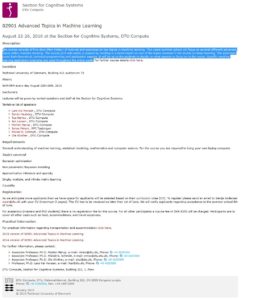The Human Activity and Vision Summer School will address the broad domains of human activity modeling and human behavior recognition, with an emphasis on vision sensors as capturing modality. Courses will comprise both tutorials and presentations of state-of-the-art methods by active researchers in the field.
The goal of the courses will be to cover most of the whole human activity analysis chain, starting from the low level processing of videos and audio for detection and feature extraction, to medium level (tracking and behavior cue extraction) and higher level modeling and recognition using both supervised and unsupervised techniques. Applications of the different methods to action and activity recognition in different domains ranging from Activities of Daily Living to surveillance (individual behavior recognition, crowd monitoring) will be considered.
List of considered topics and methodologies:
- low-level feature extraction (background subtraction, space-time interest points, tracklets)
- object detection (human, body)
- tracking (multi-object, multi-camera, audio-visual)
- behavior cue extraction (body or head pose)
- crowd monitoring
- supervised behavior recognition (statistical and symbolic approaches)
- (temporal data mining, probabilistic topic models -Latent Dirichlet Allocation, Dirichlet Processes,…)
- active learning
Presentation of real uses cases, market needs, and current bottlenecks in the surveillance domain will also be addressed, with one half day devoted to presentations and panel discussions with professional and industrial presenters.


















